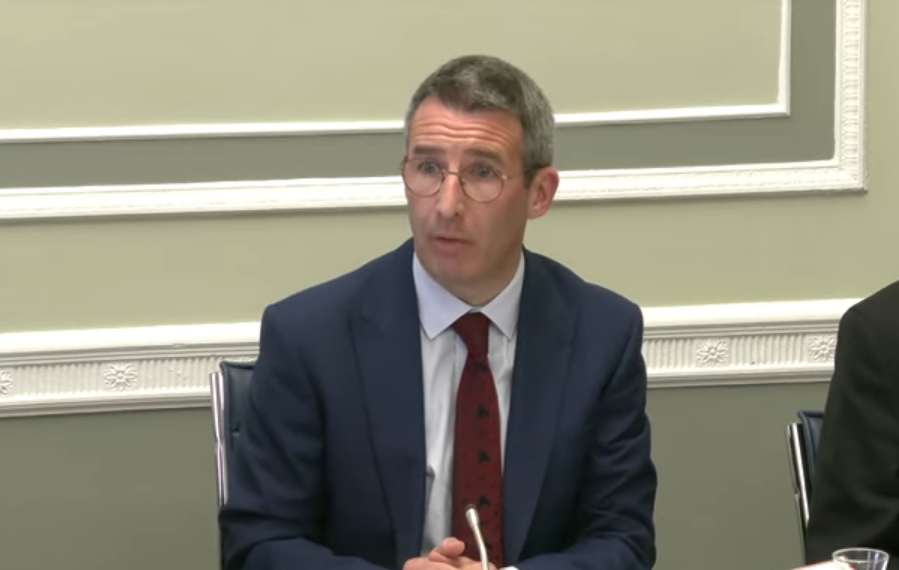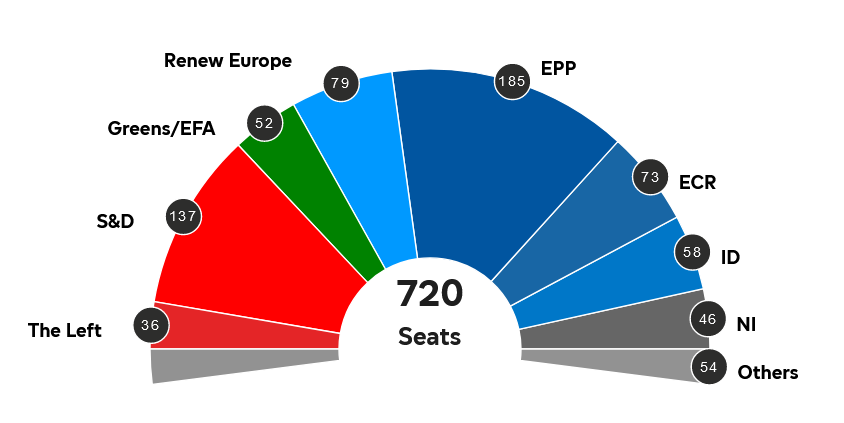Brexit & Beyond newsletter
10 June 2024
 Welcome to the 10 June 2024 Brexit & Beyond newsletter
Welcome to the 10 June 2024 Brexit & Beyond newsletter
The Committee for Agriculture, Environment and Rural Affairs was briefed by Minister Andrew Muir on recent developments regarding the Windsor Framework (Implementation) Regulations. The Windsor Framework Democratic Scrutiny Committee has published a report on EU regulation 2024/1157 on shipments of waste. The Committee also heard evidence from officials from the Food Standards Agency (FSA) NI on EU Directive 2024/1438, known as the ‘Breakfast Directives’. Elections to the European Parliament have taken place.
- Committee for Agriculture, Environment and Rural Affairs
- Windsor Framework Democratic Scrutiny Committee
- Elections to the European Parliament
- Other news
Committee for Agriculture, Environment and Rural Affairs
On Thursday 6 June, the Committee for Agriculture, Environment and Rural Affairs was briefed by Minister Andrew Muir. He told the Committee he wanted to provide clarity on the Windsor Framework (Implementation) Regulations 2024.
The Safeguarding the Union Command Paper contained a UK Government commitment to take direct powers to direct certain public authorities in relation to the implementation and observance of the Windsor Framework (Paragraph 96). This commitment was given effect through the Windsor Framework (Implementation) Regulations 2024 which came into force on 12 April. The regulations mean Northern Ireland departments will be required to exercise their functions subject to the direction and control of the Secretary of State (instead of an NI Minister), if this relates to observing or implementing the relevant provisions of the Windsor Framework, and commitments in the Command Paper. These include “the requirement to eliminate any physical checks when goods move within the UK internal market system, except those conducted by UK authorities and required as part of a risk-based or intelligence-led approach to tackling criminality, abuse of the scheme, smuggling and disease risks”. Minister Muir previously provided a list of 19 legislative acts which are no longer under his direction and control and are now matters for his department to implement under the direction and control of the relevant Secretary of State.
Recently, Minister Muir wrote to the Speaker to clarify that some areas have been returned to his direction and control by the Secretary of State, as of 17 May. The Committee heard that disease awareness, disease preparedness, and disease control in relation to animal and plant health are once again Minister Muir’s responsibility. Muir added, “Movements of goods and animals to and from GB, including operational arrangements at ports and airports, as well as the new EU laws which replace regulations under Annex 2 of the Windsor Framework have been retained by the Defra [UK Department for Environment, Food and Rural Affairs] Secretary of State.”

Minister for Agriculture, Environment and Rural Affairs Andrew Muir
Minister Muir emphasised to the Committee that ahead of the making of the regulations and publication of the statutory guidance, “there was significant engagement with the UK Government on these matters.” He stated, “I put a lot of time and effort, alongside officials, behind the scenes raising concerns, trying to understand what they were trying to achieve, and also trying to find a way that this is workable, because what we have in place is most unusual in terms of constitutional arrangements and it wouldn't be my preferred option.”
He said following concerns about the regulations’ impact, there is now an interim arrangement in place. The Minister stated, “We've landed at a position which operationally allows myself and officials to be able to work through some of the issues that are facing people in Northern Ireland, such as TB [bovine tuberculosis].”
Department of Agriculture, Environment and Rural Affairs Permanent Secretary Katrina Godfrey explained that the functions of the Department have not changed, but the Minister directing civil servants has changed in some policy areas. She said that “there are not neat, clear dividing lines” in these policy areas: “you don't go from disease prevention and disease control, without getting into animal movement in many cases.” She added, “It's not the best time in the world to be getting clarity on new areas of policy, when we're in the middle of a general election campaign, so I suspect we will not have perfect clarity for some time.”
The Minister has answered a written question on this issue.
Environment Improvement Plan
Minister Muir has brought a draft Environmental Improvement Plan to the Executive. The UK Environment Act – the UK’s post-Brexit framework for environmental protection - was passed in November 2021 and requires the Department to create an Environmental Improvement Plan (EIP), and establishes a new government watchdog, the Office for Environmental Protection (OEP). The Department was required to publish its first EIP by July 2023. The BBC reported that the deadline was missed because of the absence of a Minister.
Windsor Framework Democratic Scrutiny Committee
Report on EU regulation on shipments of waste
On 6 June, the Windsor Framework Democratic Scrutiny Committee agreed its final report on Regulation (EU) 2024/1157 on shipments of waste, a published replacement EU act. The Committee concluded that the EU law “significantly differs, in part, from the content or scope of the EU instrument which it amends or replaces”. The Committee was unable to reach a view on whether the replacement EU act “would have a significant impact specific to everyday life of communities in Northern Ireland in a way that is liable to persist”. These are the two conditions to be satisfied for the Stormont Brake to be pulled, set out in Article 13(3a) of the Windsor Framework. The Windsor Framework (Democratic Scrutiny) Regulations 2024 state that the Committee must have regard to this when deciding whether to conduct an inquiry. Read more about EU law and Northern Ireland, the Stormont Brake and the work of the Committee on our website.
The ‘Breakfast Directives’
Last week, the Committee also heard evidence from officials from the Food Standards Agency (FSA) NI on EU Directive 2024/1438, known as the ‘Breakfast Directives’. The directive updates rules on composition, labelling and processing for the marketing of honey, fruit juice, jams and marmalades, and preserved milk. The Committee heard that the EU's aim with the directive is to “increase transparency, and empower consumers to make more informed and healthier food choices.” FSA Director for Northern Ireland Andy Cole explained, “Some of the provisions in the directive introduce new requirements, while others are for Northern Ireland to decide on introducing”. He added, “some will necessitate changes by businesses whilst others provide the food industry with greater flexibility and opportunity for innovation.”
The main mandatory change for honey requires increased transparency in origin labelling of honey blends. The FSA understands that honey production in NI is primarily by small and medium-sized enterprises producing single source honey (not blends), so they would not be impacted by the change. The legislation also increases the minimum fruit content for jam, makes changes to labelling of marmalade and fruit juices, and changes the criteria for products sold as evaporated milk.
Cole noted that all these changes fall under the Food compositional standards and labelling Common Framework and officials have engaged in policy discussions under that framework. Common Frameworks are being developed in policy areas which were previously governed by EU law and which intersect with devolved competence. More information on Common Frameworks.
Cole said that at present, “There's not substantive change to the legislation…the range of products on the Northern Ireland market are largely going to remain the same, so there's no impact in terms of the removal of products. Indeed, there's opportunity for new product lines to come in.” The Committee was also told that under arrangements established in the Windsor Framework, products produced in GB can move into NI under the Retail Movement Scheme. Products produced in NI can also move freely into GB as they benefit from ‘qualified Northern Ireland goods’ status and have ‘unfettered access’ to the rest of the UK Internal Market. The FSA expects that if the legislation is implemented, Northern Ireland producers will still be able to access the Northern Ireland, GB, and EU markets.
The measures will apply from 14 June 2026 to allow food businesses time to prepare. The legislation must be transposed into secondary legislation by December 2025. Cole explained that this will be brought through the Department of Health, and scrutinised by the Committee for Health and the Assembly at that stage. The Committee decided not to hold an inquiry into the EU regulation.
Elections to the European Parliament
Elections to the European Parliament took place on 6-9 June.

Provisional results for the European Parliament 2024-2029 | Source: European Parliament
The elected parties must now form political groups, which must consist of at least 23 Members elected in at least seven Member States. The European Parliament has published a briefing on the next steps, including the election of the President of the Parliament, composition of committees, election of the European Commission President and approval of the team of Commissioners. The first plenary session of the new parliament’s term will take place from 16 to 19 July in Strasbourg.
RTÉ’s Tony Connelly reports on the outcome of the election. Politico considers the possible coalitions which could emerge.
Other news
- The Committee for the Executive Office is conducting an inquiry on differences in equality legislation between the regions of the UK and the Republic of Ireland. The Committee is holding a public consultation, which closes on 6 September. Under Article 2 of the Windsor Framework, the UK Government committed to ensuring that there would be “no diminution of rights, safeguards or equality of opportunity” (as set out in the Good Friday Agreement) as a result of the UK leaving the EU.
- On 3 June, the Minister of Education made a statement on the meeting of the North/South Ministerial Council (NSMC) in education sector on 22 May. Ministers welcomed the approval of funding under the PEACE PLUS programme under the Shared Learning Together heading.
- Invest NI has launched its 2024/25 Trade Calendar of activities and Trade Missions. The Minister for the Economy has welcomed its launch, saying, “Dual Market Access means businesses in the north can now export goods to both British and European markets, free from customs declarations, rules of origin certificates, and non-tariff barriers. It also means that businesses can use EU inputs in their products without having to ‘import’ them. The opportunity for all-island trade is also critical to economic growth and sustainability.”
- The UK in a Changing Europe has published a report on UK trade.



